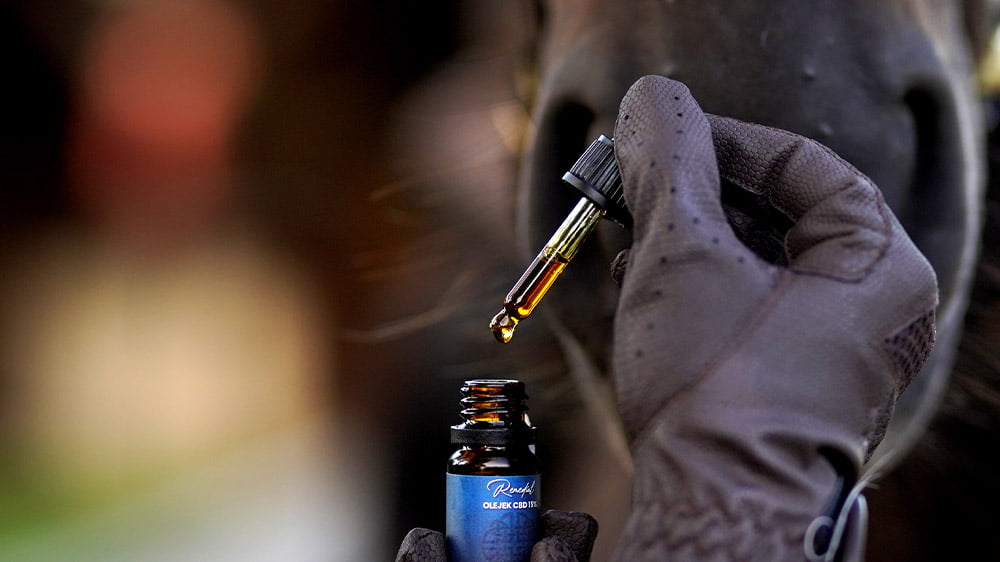Essential Bloom
69.00 zł
Essential Calm
69.00 zł
Essential Citrus
69.00 zł
Essential Forest
69.00 zł


For centuries, plants have served humans and animals. Today, as we search for natural ways to improve our health and well-being, we are increasingly reaching for essential oils. And did you know that these natural substances also work on animals?
Aromatherapy has a centuries-old tradition. Aromatherapy - literally "smell therapy, scent treatment", is based on the use of natural essential oils, from plants, to improve physical and mental health. Not just humans.
It is also used for animals that have been with us for centuries. Essential oils have a positive effect on horses, which is confirmed by research.[1].
Aromatherapy for these animals involves the use of essential oils to support mental and physical health. They can be used in many ways: through inhalation, spraying, for example, in a stable, adding to feed or rubbing into the skin.
As in the case of humans, essential oils have a positive effect on the nervous system in horses, e.g. by causing calmness. They support immunity, have a disinfecting effect or stimulate the respiratory system, especially in the case of the so-called RAO (Recurrent airway obstruction).
Because they come from nature, because they smell, and because horses have known them since they appeared in the world – because they eat them in plants. Horses, like most animals, have a very sensitive sense of smell and react intensely to aromas. Smell is an important signal, it affects their behavior, reactions and well-being. On the other hand, scientific studies confirm that some essential oils stimulate specific physiological and psychological reactions in these animals. They affect, among others, calming, reducing stress or even regulating the heart rate.[2] – which confirms the reduction of stress reactions.
Lavender, frankincense and peppermint – these are the three most important oils used in horse aromatherapy.
The number one, definitely reduces the level of stress reactions in horses both physically (the aforementioned regulation of heart rate) and mentally (behavior indicating anxiety). Lavender contains a high concentration of linalool. This is Terpene, found in over 200 plants, and the highest content can be found in hemp and lavender. It is to him that we owe its calming and soothing properties. [3]
It has anti-inflammatory, analgesic, calming, and anti-cancer properties, mainly due to the boswellic acids it contains. This oil also helps regulate the digestive system. It is usually added to feed.
It has a great effect on the digestive system, regulating its work. It is also great for the skin, has a disinfecting and warming effect, and improves the absorption of swelling.
It is excellent for horses with IBH (insect bite hypersensitivity) – hypersensitivity to insect bites, which often results in alopecia areata and skin diseases. Peppermint not only effectively repels, but also relieves itching and improves skin condition.[4]
Among the essential oils used in the aromatherapy of these beautiful animals, we can also find:
Anyone who has had the opportunity to observe the reactions of horses to essential oils can easily see that many of them seem to derive pleasure from the experience of scents. But it is not only pleasure that is at stake in aromatherapy, but also the already mentioned and confirmed in research impact on psychophysical reactions.
Essential oils support horse well-being:
There are many ways you can use aromatherapy with your pet.
In our CBD therapeutic cosmetics we use natural herbs and essential oils that enhance the effects of the most powerful ingredient, which is natural cannabidiol, or CBD. They also contain beneficial terpenes and flavonoids, as well as numerous, naturally occurring in hemp phytoactive ingredients that have a positive effect on human and animal organisms. You will find among others: helichrysum herb, lavender, Japanese knotweed, tansy, frankincense and valuable full spectrum CBD oil.
[1] http://ph.ptz.icm.edu.pl/wp-content/uploads/2016/11/12_Luszczynska.pdf
[2] https://pubmed.ncbi.nlm.nih.gov/31256887/
[3] https://www.czytelniamedyczna.pl/6830,aktywnosc-biologiczna-wybranych-skladnikow-olejkow-eterycznych-cz-2.html